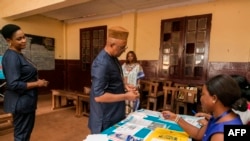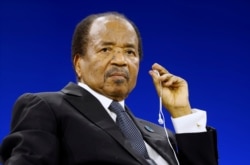Local and parliamentary elections have begun successfully in French-speaking areas of Cameroon but things are slow going in the English-speaking zones of the central African country where separatists fighters warned residents not to vote. Several election staff have been attacked. Cameroon president Paul Biya has encouraged and congratulated those who voted.
Hundreds of voters line up at the polling station at Government Bilingual Primary School Bastos in Cameroon's capital, Yaounde, to vote in the central African nation's local and parliamentary elections. Among those who voted in the early hours of the morning was Cameroon President Paul Biya. He says Cameroonians should come out massively and vote and should not listen to people he describes as detractors of his country's democracy.
He says he is very delighted and satisfied to have performed his civic responsibility and that he is calling on all citizens to ignore calls from some political parties to boycott the polls. He says as far as he is concerned, the elections indicate that democracy is progressing and is now inevitable in Cameroon.
Biya was reacting to some political parties like the Cameroon People's Party that had been calling for the cancellation of the elections in favor of a transition which will put an end to his regime. The Cameroon Renaissance Movement Party was also leading protests for the elections to be canceled.
Separatist fighters have vowed that the elections will not take place in the two English-speaking regions of the country and imposed a travel ban in Cameroon's Northwest and Southwest.
Emmanuel Acha, a 54-year-old English teacher who escaped from his northwestern village of Bafut, says he voted because he believes the Cameroon parliament needs committed people who can solve the separatist crisis in the English-speaking regions.
"I am particularly pleased to have accomplished my civic duty. This is the greatest weapon for peace and development. The greatest weapon to bring back normalcy," he said.
As many rushed to vote in the French-speaking regions, the turn out in the English- speaking Northwest and Southwest regions was very poor as many people were either scared of separatist threats or heeded calls on them not to vote.
Deben Tchoffo, governor of the English-speaking regions pleaded with voters to conquer fear and assured the population of their safety.
"I am appealing to all the citizens of the Northwest region to go to the polling stations to vote for our municipal counselors, for our parliamentarians. Those are the key persons that are going to implement the special status agreed upon after the major national dialogue," he said. "I am also asking everybody, mainly the youths of the north west region to come out massively to vote."
The special status governor Deben Tchoffo was referring to creates assemblies of chiefs, regional assemblies and regional councils for the two English-speaking regions, with each of them having elected presidents.
Many civilians have escaped from the English-speaking regions where there were battles between the military and rebels. The civilians said they did not believe the government will be able to protect them.
Early Sunday the government said suspected separatists torched a public building that hosted polling stations in the English-speaking northwestern town of Bafut. No one was wounded.
A military convoy transporting elections material to the English-speaking towns of Jakiri and Kumbo came under heavy attack from separatists in the village of Sabga on the night of the election.










